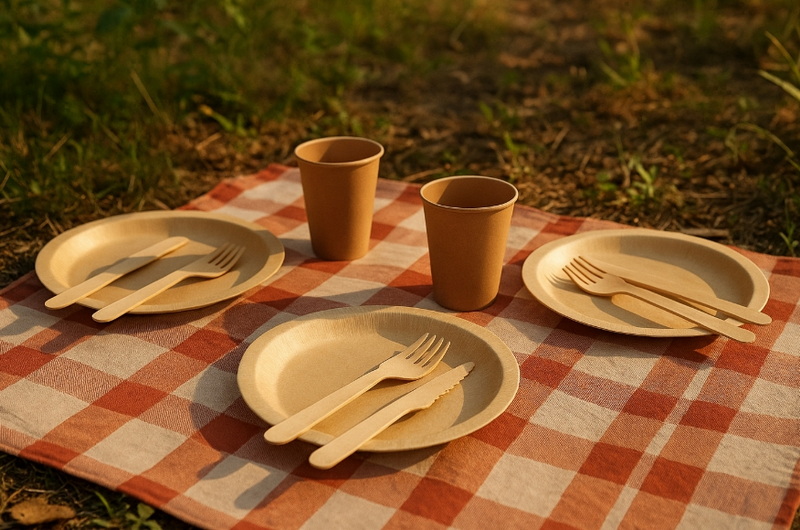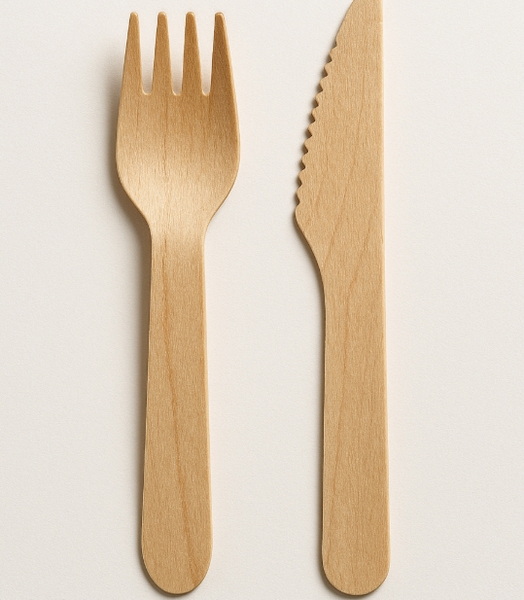
Content Menu
● Environmental Impact of Disposable Wooden Cutlery Sets
>> The Problem with Plastic Cutlery
>> Why Wooden Cutlery Sets Are Eco-Friendly
>> Lifecycle Analysis
● Health and Safety Considerations
>> Chemical-Free and Non-Toxic
>> Reducing Microplastic Ingestion
>> Naturally Antibacterial
● Practicality and User Experience
>> Strength and Durability
>> Comfort and Safety
>> Limitations
● Aesthetic and Social Appeal
>> A Natural, Elegant Look
>> Signaling Sustainability
● Suitability for Different Occasions
>> Weddings and Celebrations
>> Parties and Picnics
>> Daily Use and Business Applications
● Challenges and Limitations of Wooden Cutlery
>> Cost Considerations
>> Strength and Performance
>> Composting Infrastructure
● Conclusion
● FAQ
>> 1. Are disposable wooden cutlery sets compostable?
>> 2. Can disposable wooden cutlery sets be reused?
>> 3. Are wooden cutlery sets safe for children?
>> 4. How do disposable wooden cutlery sets compare to bamboo cutlery?
>> 5. Do disposable wooden cutlery sets have a taste or odor?
As environmental awareness grows and single-use plastics face increasing scrutiny, the debate over disposable wooden cutlery sets versus plastic cutlery has become more relevant than ever. This comprehensive article explores whether wooden cutlery sets truly offer a superior alternative to plastic, examining their environmental impact, health and safety, practicality, aesthetics, and suitability for various uses. We will also address common questions and provide clear guidance for individuals and businesses seeking sustainable dining solutions.

Environmental Impact of Disposable Wooden Cutlery Sets
The Problem with Plastic Cutlery
Plastic cutlery, while convenient and inexpensive, has a devastating impact on the environment. Each year, billions of plastic utensils are discarded, often ending up in landfills or oceans. Plastic can take centuries to decompose, contributing to long-term pollution and harming wildlife that may ingest or become entangled in plastic debris. The production of plastic cutlery also relies on fossil fuels, further depleting non-renewable resources and increasing greenhouse gas emissions.
Why Wooden Cutlery Sets Are Eco-Friendly
Disposable wooden cutlery sets are made from renewable resources such as birch or bamboo. These materials are sourced from responsibly managed forests and are biodegradable, breaking down naturally within months rather than centuries. Unlike plastic, wooden cutlery does not leave behind microplastics or toxic residues. The manufacturing process for wooden utensils typically requires less energy and emits fewer greenhouse gases, resulting in a lower carbon footprint overall.
Wooden cutlery is also compostable, meaning it can be disposed of in home or commercial composting systems and will return to the earth as harmless organic matter. This makes disposable wooden cutlery sets a clear winner for those seeking to minimize their environmental impact.
Lifecycle Analysis
A full lifecycle analysis shows that wooden cutlery, from raw material extraction to disposal, is far less damaging to the environment than plastic. Wood is harvested from renewable sources, processed with minimal chemicals, and decomposes quickly after use. In contrast, plastic cutlery is derived from petroleum, requires energy-intensive manufacturing, and persists in the environment for generations.
Health and Safety Considerations
Chemical-Free and Non-Toxic
One of the main health concerns with plastic cutlery is the potential for harmful chemicals, such as BPA and phthalates, to leach into food—especially when exposed to heat. These chemicals have been linked to hormone disruption, reproductive issues, and even cancer. Disposable wooden cutlery sets, by contrast, are made from natural materials and are often untreated or simply heat-treated, ensuring they remain free from toxic substances.
Reducing Microplastic Ingestion
Microplastics have infiltrated the global food chain, and using plastic utensils can contribute to the problem. Wooden cutlery eliminates the risk of ingesting microplastics, offering a safer dining experience for both adults and children.
Naturally Antibacterial
Wood possesses natural antibacterial properties, making wooden cutlery less likely to harbor harmful bacteria compared to plastic, which can develop tiny cracks that trap germs. This makes disposable wooden cutlery sets a hygienic choice for food service.
Practicality and User Experience
Strength and Durability
Disposable wooden cutlery sets are sturdy and capable of handling most foods, from salads and pastas to desserts. While they may not match the strength of metal utensils, they outperform many plastic alternatives, which can bend or break under pressure. Wooden utensils are less likely to warp or melt when exposed to hot foods.
Comfort and Safety
Wooden cutlery is smooth, lightweight, and comfortable to hold. It does not conduct heat, reducing the risk of burns, and its natural texture provides a pleasant tactile experience. Unlike plastic, wood does not develop sharp edges that can scratch cookware or injure users.
Limitations
Despite their many advantages, disposable wooden cutlery sets have some limitations. They are generally intended for single use and are not dishwasher safe. Cutting through tough or dense foods, such as steak, can be challenging with wooden knives. However, for most casual dining situations, they perform admirably.
Aesthetic and Social Appeal
A Natural, Elegant Look
Wooden cutlery adds a touch of rustic charm and sophistication to any table setting. Its natural appearance complements a wide range of event themes, from bohemian weddings to outdoor picnics. The visual appeal of wooden utensils can even enhance the perceived value of a meal, making them a popular choice for upscale catering and eco-conscious restaurants.
Signaling Sustainability
Using disposable wooden cutlery sets sends a clear message of environmental responsibility. For businesses, this can attract eco-minded customers and differentiate their brand in a crowded market. For individuals, it reflects a commitment to sustainable living and can inspire others to make greener choices.

Suitability for Different Occasions
Weddings and Celebrations
Wooden cutlery is ideal for large gatherings where convenience and sustainability are priorities. It offers a refined alternative to plastic, aligning with the values of modern couples and event planners who want to minimize waste.
Parties and Picnics
For birthday parties, family reunions, and outdoor picnics, disposable wooden cutlery sets provide a practical and eco-friendly solution. They are lightweight, easy to transport, and can be composted on-site or at home.
Daily Use and Business Applications
Incorporating wooden cutlery into daily routines—whether at home, in the office, or on the go—can significantly reduce plastic waste. Food service businesses, including restaurants, cafes, and food trucks, benefit from the positive public perception and environmental advantages of switching to wooden utensils.
Challenges and Limitations of Wooden Cutlery
Cost Considerations
While the price of disposable wooden cutlery sets has become more competitive, they are still generally more expensive than mass-produced plastic utensils. However, the environmental and health benefits often outweigh the marginal increase in cost, especially for businesses seeking to enhance their sustainability credentials.
Strength and Performance
Wooden cutlery is not as strong as metal and may struggle with very tough foods. For most everyday uses, however, it is sufficiently durable and reliable.
Composting Infrastructure
The full environmental benefits of wooden cutlery are realized only when proper composting facilities are available. In areas without access to composting, wooden utensils may still end up in landfills, where they decompose more slowly. Nevertheless, they remain a better choice than plastic, which never fully breaks down.
Conclusion
Disposable wooden cutlery sets offer a compelling alternative to plastic utensils, excelling in environmental sustainability, health safety, and aesthetic appeal. They are made from renewable resources, are biodegradable and compostable, and contain no harmful chemicals. While they may not be suitable for every situation—such as cutting very tough foods or in regions lacking composting infrastructure—their advantages far outweigh their limitations for most uses.
Switching to disposable wooden cutlery sets is a simple yet impactful way to reduce plastic waste, protect the environment, and promote a healthier lifestyle. Whether for personal use, special events, or business operations, wooden cutlery is a choice that aligns with the values of a greener, more responsible future.

FAQ
1. Are disposable wooden cutlery sets compostable?
Yes, disposable wooden cutlery sets are compostable. They can be broken down in home or commercial composting systems, returning to the earth as organic matter.
2. Can disposable wooden cutlery sets be reused?
Disposable wooden cutlery sets are designed for single use. While they can sometimes be washed and reused for light tasks, they are not as durable as metal utensils and are best composted after use.
3. Are wooden cutlery sets safe for children?
Yes, wooden cutlery sets are safe for children. They are free from harmful chemicals and have smooth, rounded edges, making them a safe choice for all ages.
4. How do disposable wooden cutlery sets compare to bamboo cutlery?
Both wooden and bamboo cutlery sets are eco-friendly and biodegradable. Bamboo tends to be slightly stronger and grows faster, making it an excellent renewable resource. However, both options are superior to plastic in terms of environmental impact.
5. Do disposable wooden cutlery sets have a taste or odor?
High-quality disposable wooden cutlery sets are made from untreated or heat-treated wood and should not impart any noticeable taste or odor to food. Lower-quality products may have a slight woody aroma, but this is generally mild and harmless.

















